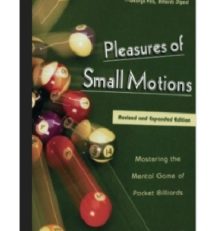Pleasures of Small Motions (Bob Fancher, Ph.D.)
The primary focus of most billiard instruction books is mechanical and strategic in nature, covering topics such as stance, aim, grip, stroke, draw and follow, spin/english, shot types, geometry, ball patterns, position play, defense etc. One aspect of billiard play often overlooked, however, is the mental and emotional aspect of the game. If the book addresses the topic at all, this subject is usually covered as an afterthought and late in the book. Yet no matter how solid and reliable a player is in terms of shooting ability and strategic thinking, it is a player’s frame of mind at the table that can often be the deciding factor in a match.
Any player who’s been around for a while has seen it happen at one time or another. Things aren’t going so well for a player in a game, and the player starts getting frustrated. The more frustrated they become, the worse they play. The worse they play, the more frustrated they become. At its worst, tempers can flare and all perspective is lost. It’s only a game after all, it’s not like life or death is riding on a match. Yet you wouldn’t know that to see the anger in the player’s face and actions. Maybe there are times when you yourself have been that player. You have no idea what is happening or why your game has gone south, and it seems like there is nothing you can do about it. Once you’ve dug yourself into an emotional hole like that, it’s very difficult to recover. At times like these, having an arsenal of mental techniques for getting your game back on track is an invaluable resource. Even better is knowing how to prevent yourself from digging yourself into the hole in the first place.
As far as I know, there is only one book on pocket billiards which focuses exclusively on the mental game. The book is Pleasures of Small Motions, and it does a great job of providing players with the tools and perspectives needed to manage their mental state in a match. The author, Bob Fancher, received a Ph.D. in philosophy before training as a psychotherapist; he was a practicing psychotherapist in New York City for fourteen years. He’s also a billiard enthusiast with a real love and appreciation for the game. He wrote columns about the mental game of billiards for Billiards Digest and The American Cueist magazines before writing this book, which came out in 2000 (with a second edition published in 2002). Bob brings his insights from both the psychology and billiard disciplines together in a way no one ever has before or since, shedding considerable light on this poorly understood yet crucial aspect of billiard play.
Some readers may find reading this book to be a little daunting, and granted, it’s not an easy read. While many pool players often have an intuitive feel for human nature, the majority are not particularly interested in the kind of self-examination and personal awareness this book demands in order to get the most value from it. If I have one criticism of this book, it’s that the author could have reached a larger audience for the book if he had simplified his use of English (the language, not cue ball spin) in the course of writing it. As such, I would not recommend this book to the casual player who has little interest in, or desire to, gain a broader perspective of the mental aspects of pool playing in order to improve their play.
Players who are on the other side of this fence – players who have experienced emotional meltdowns in the course of a match which guaranteed a loss, and who realize they need something of a check up from the neck up in order to prevent future meltdowns and play their best game – will gain a great deal of useful information from reading this book.
The author thoroughly covers the following topics in his book:
- The motivation for playing billiards
- The mind-body connection in billiard play
- Improving concentration at the table
- The importance of rhythm (physical and emotional)
- Modulating emotions during game play
- Confidence and its influence on your game
- Placing pool in the proper context of everyday life
- Competition and your opponent
- Finding pleasure in competition
This book can be of great value to players who have at least two or three years of experience playing pool on a regular basis, who have developed some skill but in certain situations or against certain players, they hit an emotional wall – their game seems to fall apart and they can’t get back on track. After reading this book, even if you don’t read it cover to cover, you’ll come away with insights into the psychology of game play that will pay dividends no other billiard instruction book can provide.

